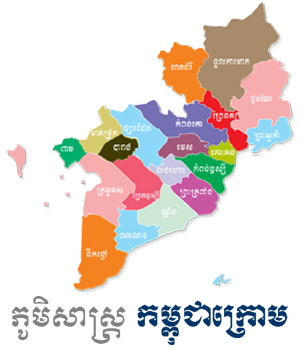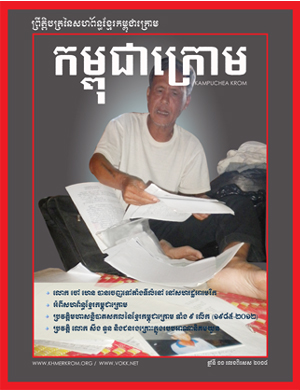Soeung Hai, a dissident former monk wanted for arrest by the government, said on Tuesday that he had been living in Sweden since February after the U.N.’s refugee agency helped him secure political asylum there.

Soeung Hai poses in Ostersund, Sweden, last month, in a photograph posted to his Facebook page.
Yet the Swedish Embassy in Phnom Penh said it was not aware Mr. Hai was in Sweden, and a spokeswoman for the U.N.’s High Commissioner for Refugees (UNHCR) said she could not comment on the case.
Mr. Hai, once a constant thorn in the government’s side, was most recently ordered arrested in November for continuing to wear monk robes after being defrocked and jailed in late 2014 for protesting.
Released along with seven other activists in April last year, he said by telephone from Sweden’s Ostersund province on Tuesday that he had fled to Thailand in July, sought asylum with the U.N. there in November and arrived in Sweden in February.
“So far, I have been here for two months and 10 days. I received political asylum from the U.N. because of persecution from the Cambodian government,” Mr. Hai said, adding that he was now enrolled in a technical college.
“I am being taken care of by the Swedish government. I am studying welding at school,” he said. “Everything, like housing and food, is being taken care of by the Swedish government. They give me about $30 a day.”
“After five years, I will have citizenship. In the five years, I will study hard and save money, then I will be back to serve the people and society,” he added.
On Monday, Vivian Tan, the regional spokeswoman for the UNHCR, said she was unable to comment on whether the agency had in fact assisted Mr. Hai in securing political asylum in Sweden.
“[W]e don’t comment on individual cases for confidentiality reasons,” Ms. Tan said in an email.
A representative of the Swedish Embassy said on Monday that it had not been informed about the case.
“The Embassy was not aware that Soeung Hai is in Sweden—no prior information had reached us to this effect before your email,” Kristina Kuhnel, head of development cooperation at the embassy, said in an email.
“We have no information as to whether Soeung Hai has applied for asylum in Sweden,” she added.
Asked about Mr. Hai’s account on Tuesday, Ms. Kuhnel said the embassy did not have any more information.
“Please also note that matters relating to asylum are treated [as] confidential in Sweden,” she said.
Mr. Hai said on Tuesday that he had fled Cambodia after being tipped off about plans to jail him following a July 19 trip to inspect a Vietnamese border incursion in Svay Rieng province with CNRP lawmakers and 2,500 others.
“On July 29, 2015, after I joined the protest on the border…I received a phone call from a kind higher police official [at] the Interior Ministry who pitied me, who told me to urgently flee because the government planned to arrest and imprison me again,” he said.
He said he had then fled to a pagoda in rural Thailand, where he took in the news of two of his former monk associates being arrested in Phnom Penh on August 1 for drug possession—a raid he believes was targeting him. He was then convicted in November of falsely posing as a monk.
“At first, when I went to stay in Thailand, I did not immediately request political asylum, as I wanted to wait to see the situation,” Mr. Hai said. “Then, on November 3, the court convicted me in absentia of wearing monks’ robes…and issued a warrant to arrest me.”
“I decided to bring the conviction and arrest warrant to ask for the U.N. in Thailand to intervene, but then the Thai military government accepted a request from the Cambodian government to find and arrest me,” he continued.
“One day in December, dozens of Thai soldiers in three big trucks came and surrounded the pagoda where I was staying, but fortunately, the U.N. officials came and rescued me,” and soon after secured him asylum, he said.
Mr. Hai was born into an ethnic Khmer Krom family in Tra Vinh province in Southern Vietnam, which many Cambodians consider to be rightfully a part of Cambodia that was illegally ceded to Vietnam by the French in 1949.

Soeung Hai shouts from atop a post demarcating the boundary between Cambodia and Vietnam in Svay Rieng province during an opposition-led protest in July. (Alex Willemyns/The Cambodia Daily)
He came to public prominence during protests in Phnom Penh in July 2014 against a Vietnamese Embassy official who said on the radio that Southern Vietnam had long belonged to the Vietnamese people.
Burning the Vietnamese flag at one protest, Mr. Hai later joined other opposition demonstrations, including one outside the Phnom Penh Municipal Court in November 2014 when seven land rights activists were sentenced to a year in prison for blocking a street with a bed.
He was arrested alongside three others during the protest for “obstructing officials,” and during a snap trial the following day sentenced to a year in prison. He was released in April last year.
However, despite being formally defrocked by religious authorities prior to being jailed, Mr. Hai returned to the Stung Meanchey pagoda in Phnom Penh but was kicked out the following month. He continued to be politically active, traveling with the CNRP lawmakers to inspect the Vietnamese border incursion in July, before disappearing.
Interior Ministry spokesman Khieu Sopheak on Tuesday congratulated Mr. Hai on securing asylum in Sweden and asked the Swedish government to grant visas to all convicts in Cambodia.
“Please take all our other 19,000 prisoners to your country. We’d be really happy. Please, take the prisons, too. We will congratulate you. Please, make our Khmer prisons empty. Oh! We’d be so happy,” General Sopheak said.
“If any country wants them, we are happy to give them all,” he said. “We’d bring them to you.”
Yet Gen. Sopheak said Mr. Hai would be sent straight to prison if he ever tried to set foot in Cambodia again.
“We have the arrest warrant in our hands, so it is clear he will go to prison. When you are there, please keep quiet, don’t be annoying,” he said.
Council of Ministers spokesman Phay Siphan said the government was not embarrassed that the political asylum granted to Mr. Hai implied that Sweden’s government acknowledged that the former monk had been persecuted.
“People who receive asylum work against the government to earn their asylum,” Mr. Siphan said.
“He is a coward. Being arrested is normal. A number of politicians have been jailed for a long time, but they stuck behind their principles and did not run away. People who seek political asylum have no principles.”
Sources: Cambodia Daily













